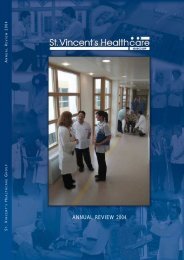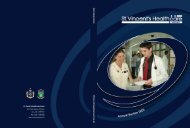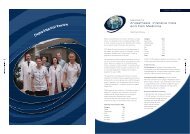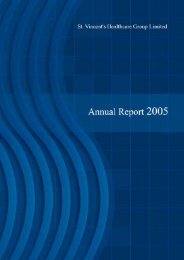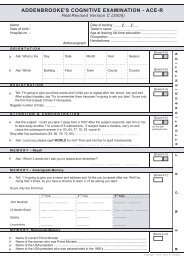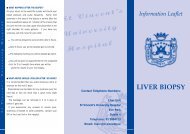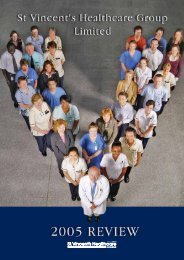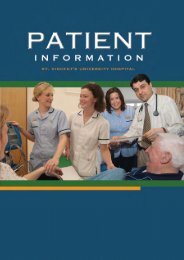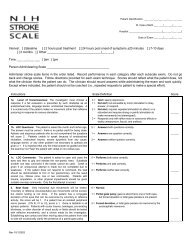- Page 3 and 4: Review 2007 St. Vincent’s Healthc
- Page 5 and 6: St. Vincent’s Healthcare Group Li
- Page 7 and 8: Celebrations • There was a great
- Page 9 and 10: Research Studies Total Research Stu
- Page 12 and 13: St. Vincent’s Healthcare Group Li
- Page 14 and 15: 14 Research
- Page 16 and 17: St. Vincent’s Healthcare Group Li
- Page 18 and 19: St. Vincent’s Healthcare Group Li
- Page 20 and 21: St. Vincent’s Healthcare Group Li
- Page 22 and 23: St. Vincent’s Healthcare Group Li
- Page 24 and 25: St. Vincent’s Healthcare Group Li
- Page 26 and 27: St. Vincent’s Healthcare Group Li
- Page 28 and 29: St. Vincent’s Healthcare Group Li
- Page 30 and 31: The bioinformatics group moved with
- Page 32 and 33: St. Vincent’s Healthcare Group Li
- Page 36 and 37: St. Vincent’s Healthcare Group Li
- Page 38 and 39: St. Vincent’s Healthcare Group Li
- Page 40 and 41: St. Vincent’s Healthcare Group Li
- Page 42 and 43: St. Vincent’s Healthcare Group Li
- Page 44 and 45: St. Vincent’s Healthcare Group Li
- Page 46 and 47: In collaboration with Prof. Kingsto
- Page 48 and 49: Education & Research Poster Present
- Page 50 and 51: St. Vincent’s Healthcare Group Li
- Page 52 and 53: St. Vincent’s Healthcare Group Li
- Page 54 and 55: St. Vincent’s Healthcare Group Li
- Page 56 and 57: Education & Research Pharmaceutical
- Page 58 and 59: St. Vincent’s Healthcare Group Li
- Page 60 and 61: Prestigious Invitations/Honours for
- Page 62 and 63: St. Vincent’s Healthcare Group Li
- Page 64 and 65: St. Vincent’s Healthcare Group Li
- Page 66 and 67: St. Vincent’s Healthcare Group Li
- Page 68 and 69: St. Vincent’s Healthcare Group Li
- Page 70 and 71: St. Vincent’s Healthcare Group Li
- Page 72 and 73: St. Vincent’s Healthcare Group Li
- Page 74 and 75: 74 Quality
- Page 76 and 77: St. Vincent’s Healthcare Group Li
- Page 78 and 79: St. Vincent’s Healthcare Group Li
- Page 80 and 81: St. Michael’s Hospital Nursing Th
- Page 82: St. Vincent’s Healthcare Group Li
- Page 85 and 86:
St. Vincent's Private Hospital Cons
- Page 87 and 88:
St. Vincent's Private Hospital A mo
- Page 89 and 90:
St. Vincent's Private Hospital Nurs
- Page 91 and 92:
St. Vincent’s Healthcare Group Li
- Page 93 and 94:
St. Vincent's Private Hospital Nati
- Page 95 and 96:
St. Vincent's Private Hospital Supp
- Page 97 and 98:
St. Vincent’s Healthcare Group Li
- Page 99 and 100:
St. Vincent's Private Hospital Trai
- Page 101 and 102:
St. Vincent's Private Hospital Occu
- Page 103 and 104:
St. Vincent’s Healthcare Group Li
- Page 105 and 106:
St. Vincent's Private Hospital The
- Page 107 and 108:
St. Vincent’s Healthcare Group Li
- Page 109 and 110:
St. Vincent’s Healthcare Group Li
- Page 111 and 112:
Report from the Director of Operati
- Page 113 and 114:
St. Vincent’s Healthcare Group Li
- Page 115 and 116:
St. Vincent’s Healthcare Group Li
- Page 117 and 118:
Department - Chaplaincy/Pastoral Ca
- Page 119 and 120:
St. Vincent’s Healthcare Group Li
- Page 121 and 122:
Department - Library & Information
- Page 123 and 124:
St. Vincent’s Healthcare Group Li
- Page 125 and 126:
St. Vincent’s Healthcare Group Li
- Page 127 and 128:
St. Vincent’s Healthcare Group Li
- Page 129 and 130:
St. Vincent’s Healthcare Group Li
- Page 131 and 132:
St. Vincent’s Healthcare Group Li
- Page 133 and 134:
St. Vincent’s Healthcare Group Li
- Page 135 and 136:
St. Vincent’s Healthcare Group Li
- Page 137 and 138:
St. Vincent’s Healthcare Group Li
- Page 139 and 140:
Allied Health Professionals - Occup
- Page 141 and 142:
Allied Health Professionals - Pharm
- Page 143 and 144:
Allied Health Professionals - Pharm
- Page 145 and 146:
St. Vincent’s Healthcare Group Li
- Page 147 and 148:
Allied Health Professionals - Physi
- Page 149 and 150:
St. Vincent’s Healthcare Group Li
- Page 151 and 152:
Allied Health Professionals - Depar
- Page 153 and 154:
St. Vincent’s Healthcare Group Li
- Page 155 and 156:
St. Vincent’s Healthcare Group Li
- Page 157 and 158:
Report from the Director of Nursing
- Page 159 and 160:
St. Vincent’s Healthcare Group Li
- Page 161 and 162:
St. Vincent’s Healthcare Group Li
- Page 163 and 164:
Hospital Hygiene Services St. Vince
- Page 165 and 166:
165
- Page 167 and 168:
Department of Medical Oncology inco
- Page 169 and 170:
Department - Medicine at UCD. This
- Page 171 and 172:
St. Vincent’s Healthcare Group Li
- Page 173 and 174:
St. Vincent’s Healthcare Group Li
- Page 175 and 176:
St. Vincent’s Healthcare Group Li
- Page 177 and 178:
St. Vincent’s Healthcare Group Li
- Page 179 and 180:
St. Vincent’s Healthcare Group Li
- Page 181 and 182:
Department of Cardiology The demand
- Page 183 and 184:
Papers Published & Accepted Ponikow
- Page 185 and 186:
Department - Medicine Department of
- Page 187 and 188:
St. Vincent’s Healthcare Group Li
- Page 189 and 190:
Department of Endocrinology & Diabe
- Page 191 and 192:
St. Vincent’s Healthcare Group Li
- Page 193 and 194:
Department of Endocrinology & Diabe
- Page 195 and 196:
Lios Aoibhinn Cancer Support Centre
- Page 197 and 198:
Issues continuing to challenge the
- Page 199 and 200:
Department of Nephrology Staff Cons
- Page 201 and 202:
Service Developments Neurology in t
- Page 203 and 204:
St. Vincent’s Healthcare Group Li
- Page 205 and 206:
Department of Clinical Neurophysiol
- Page 207 and 208:
St. Vincent’s Healthcare Group Li
- Page 209 and 210:
Department of Respiratory Medicine
- Page 211 and 212:
St. Vincent’s Healthcare Group Li
- Page 213 and 214:
St. Vincent’s Healthcare Group Li
- Page 215 and 216:
St. Vincent’s Healthcare Group Li
- Page 217 and 218:
St. Vincent’s Healthcare Group Li
- Page 219 and 220:
St. Vincent’s Healthcare Group Li
- Page 221 and 222:
St. Vincent’s Healthcare Group Li
- Page 223 and 224:
Report from the Professor of Surger
- Page 225 and 226:
St. Vincent’s Healthcare Group Li
- Page 227 and 228:
St. Vincent’s Healthcare Group Li
- Page 229 and 230:
Department - Surgery Department of
- Page 231 and 232:
St. Vincent’s Healthcare Group Li
- Page 233 and 234:
Department - Operating Theatre Deco
- Page 235 and 236:
Department - Surgery Department Ort
- Page 237 and 238:
St. Vincent’s Healthcare Group Li
- Page 239 and 240:
Department - Plastic Surgery Dr Law
- Page 241 and 242:
Cancer remains a significant focus
- Page 243 and 244:
Department - Urology Consults • 3
- Page 245 and 246:
St. Vincent’s Healthcare Group Li
- Page 247 and 248:
Department of Vascular Surgery Pres
- Page 249 and 250:
Reports Medical and Surgical Gastro
- Page 251 and 252:
St. Vincent’s Healthcare Group Li
- Page 253 and 254:
St. Vincent’s Healthcare Group Li
- Page 255 and 256:
St. Vincent’s Healthcare Group Li
- Page 257 and 258:
St. Vincent’s Healthcare Group Li
- Page 259 and 260:
St. Vincent’s Healthcare Group Li
- Page 261 and 262:
St. Vincent’s Healthcare Group Li
- Page 263 and 264:
Department - Radiology Radiography
- Page 265 and 266:
St. Vincent’s Healthcare Group Li
- Page 267 and 268:
Department of Old Age Psychiatry Th
- Page 269 and 270:
St. Vincent’s Healthcare Group Li
- Page 271 and 272:
Report from the General Services Ma
- Page 273 and 274:
St. Vincent’s Healthcare Group Li
- Page 275 and 276:
General Services The HACCP system i
- Page 277 and 278:
St. Vincent’s Healthcare Group Li
- Page 279 and 280:
General Services necessitated in ex
- Page 281 and 282:
St. Vincent’s Healthcare Group Li
- Page 283 and 284:
Reports Report from the Human Resou
- Page 285 and 286:
St. Vincent’s Healthcare Group Li
- Page 287 and 288:
St. Vincent’s Healthcare Group Li
- Page 289 and 290:
ICT Department Staffing In 2007 we
- Page 291 and 292:
St. Vincent’s Healthcare Group Li
- Page 293 and 294:
Purchasing & Procurement Department
- Page 295 and 296:
St. Vincent’s Healthcare Group Li
- Page 297 and 298:
St. Vincent’s Healthcare Group Li
- Page 299 and 300:
St. Vincent’s University Hospital




